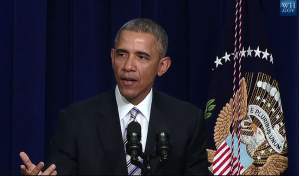
President Barack Obama defended his actions on Wednesday on why he refused to identify terrorists as Muslim extremists in his quest to "discredit violent ideologies."
According to Juliet Eilperin of the Washington Post, the president made his keynote speech at the White House Summit on Countering Violent Extremism. He hoped to strike a balance between countering the radicalization risk of young people while reassuring Muslim Americans that their communities are not intentionally targeted as a source of terror plots.
"We are not at war with Islam," Obama said. "We are at war with people who have perverted Islam."
The president added that "we must never accept the premise they put forward" and "grant them the legitimacy that they seek." According to Dan Friedman of New York Daily News, the president said that doing so would empower violent people and contradict American values.
"They are not religious leaders. They are terrorists," Obama said in reference to terror groups such as ISIS and al-Qaida.
According to Eilperin, the president's critics have wondered why the White House was hesitant to use the term "radical Islam" in describing the threats faced from groups such as ISIS. Obama contended that "there is no one profile of a violent extremist or terrorist."
"We are here at this summit because of the urgent threat from groups like al-Qaida and ISIL," Obama said. "And this week, we are focused on prevention, preventing these groups from radicalizing, recruiting or inspiring others to violence in the first place."
The Washington Post reported that the president outlined a multi-pronged approach to counter the allure of terrorist groups. Obama wanted to boost the resources of local communities so they could effectively compete against the social media propaganda used by ISIS and al-Qaida.
"Engagement with communities can't be a cover for surveillance," Obama said. "It can't securitize our relationship with Muslim Americans, dealing with them solely through the prism of law enforcement."
Friedman reported that Obama then read a Valentine's Day card from an American fifth-grader named Sabrina, 11, who was a Muslim.
"I am worried about people hating Muslims," Sabrina wrote. "If some Muslims do bad things, that doesn't mean all of them do. Please tell everyone that we are good people, and we are just like everyone else."
In referencing the letter, the president asked Americans "to remember that 11-year-old girl" and other children like her as they consider how to take out terrorism.
"That's our hope," Obama said. "That's our future. That is how we defeat violent ideologies, by making sure her voice is lifted up, making sure she's nurtured, making sure that she's supported."
The president's latest comments may have been inspired from previous remarks he made at the National Prayer Breakfast earlier this month. Olivier Knox of Yahoo News reported that people from both parties took jabs at Obama's comparison of terror committed in the name of Islam to those who did "terrible deeds" in the name of Christianity, most notably back in the Crusades.
"There's a set of words, it's almost as if they're given a card - a do-not-speak card," Sen. Ted Cruz, R-Texas, said. "The words 'radical Islamic terrorism' do not come out of the president's mouth. The word 'jihad' does not come out of the president's mouth. And that is dangerous."
"You look at the vast majority of terrorist attacks that are being committed around the world, there's one common element here and it is this radical Islamist ideology," Rep. Tulsi Gabbard, D-Hawaii, said. "This war cannot be won, this enemy and threat cannot be defeated unless we understand what's driving them, what is their ideology."
Tommy Vietor, a former spokesman for Obama's National Security Council, tried to clearly explain the president's approach to Yahoo News.
"What you're trying to do in using language that is very specific - this is a war against al-Qaida, this is a war against ISIL - is trying not to allow your words to be used for propaganda that will convince people all over the Muslim world that we're actually at war with Islam," Vietor said.
Vietor added that the president "has a tendency to try to speak and sort of try to understand where the other person is coming from."
"It's not a crazy thing to say it could help you understand their motivation or the enemy's motivation, which could help you defeat them," Vietor said.
According to Yahoo News, Vietor thought Obama's strategy has yielded some results.
"Bin Laden himself thought Obama's language made it hard to recruit," Vietor said. "You would think that this would sort of end the debate."
However, Obama may have a difficult time convincing Americans that his strategy of dealing with ISIS and other Islamic terror groups would work long-term. A Pew Research Center poll conducted back in September 2014 found that 50 percent of Americans said that Islam is more likely to encourage violence among its followers, while 39 percent disagreed with that notion.
"While the new survey does not ask about ISIS specifically, 67 percent last month identified the militant group in Iraq and Syria as a 'major threat' to the U.S.," Pew wrote.







